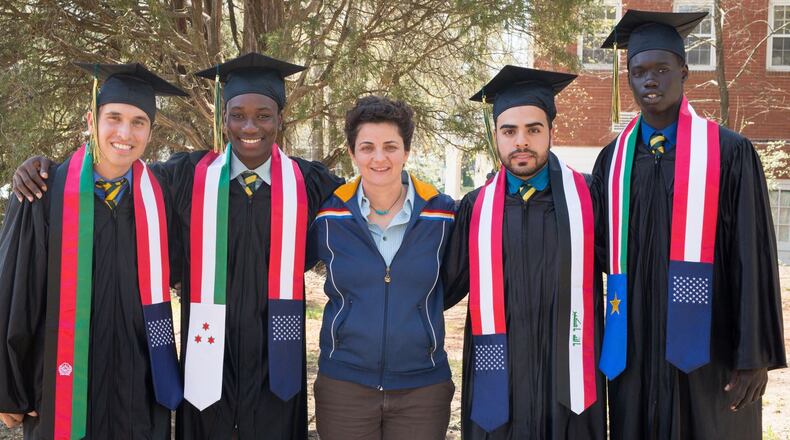When Luma Mufleh decided to start a private school in Clarkston for refugee students, she wanted a high quality program her own children would want to attend but could not — because they were too privileged.
The tuition-free Fugees Academy, an outgrowth of Mufleh's celebrated Fugee soccer teams, serves children who have experienced devastation and loss — loss of family, safety and homeland. Indeed, our interview at the school was interrupted because an anguished student needed to talk to Mufleh. He had lost four relatives in a bombing a day earlier in his home nation of Syria.
Turmoil has been the reality for the 90 students in grades 6 through 12 at the academy, housed in a church building not far from the soccer fields where Mufleh first bonded with the children of Clarkston in 2004. The school, like the soccer team, has become an anchor for children whose worlds have been torn apart.
“We have kids who won’t have eaten for a week and when we ask them why they didn’t tell us, they will explain they will have food next week so it’s not that bad — because they went months without food,” said Mufleh.
Mufleh is about to expand her school model to Ohio, opening a Fugees Academy in Columbus in August and the following year in Cleveland. The Ohio schools, which will grow one grade at a time, will eventually be 3.5 times larger than Clarkston.
Mufleh, her partner and their two young children are moving to Columbus, but she expects to spend a quarter of her time in Georgia managing the schools and developing new school leaders.
The politics in Ohio have proven less challenging with Mufleh already sitting down with Gov. John Kasich, who told her, “Who could object to what you are doing?”
“I have had meetings in Ohio that took seven years to get here in Georgia. I have never met with Gov. Deal,” said Mufleh.
What also makes Ohio appealing — and puts Indiana on Mufleh’s radar for future replication — is the availability of voucher programs that enable low-income children to attend private schools. In Georgia, Mufleh fund-raises to cover the annual $14,000-per-student costs for the year-round Fugees Academy program.
“We admit the students testing at the lowest level,” said Mufleh, explaining most sixth graders read at a pre-school level. The goal is to advance them to third or fourth grade reading levels at year’s end, so, by high school, they are fluent.
For every student at the academy, another is on the waitlist. Most arrive with limited English and only a year or two of formal education in their backgrounds. The student-teacher ratio is 10 to 1. The school graduated its first class in 2016, sending all of its grads that year and last to college.
Mufleh came to the United States from Jordan in 1993 to attend Smith College, a top women's school in Massachusetts renowned for producing firebrands and reformers. For her efforts founding the Fugees Family, Mufleh has netted several national awards, most recently winning the Diane von Furstenburg's People's Voice Award last month. In 2016, CNN named her a Top 10 CNN Hero.
When I first interviewed her for the AJC in 2005, Mufleh was at the beginning of her journey with her soccer team. Even then, she set high standards for players, requiring they show up on time and work hard or risk being benched. She said her kids had to overcome bias and prejudice and prove themselves. They could not expect America to give them a pass or a pat for past trials they endured.
Mufleh’s standards remain high for her students. She insists they advocate for themselves, asking parents to step aside and allow the children to explain why they’re late for class or can’t make practice. The school holds fast to rigid policies on zeroes for late work. Ninety percent of students earn an F during their tenure at the school.
In fact, students read their grades to the whole school at a grade assembly the end of every marking period. “Everyone knows who’s failing. Everyone knows who’s excelling. Everyone knows who needs a little bit more help,” said Mufleh. “It’s an accountability piece. It’s a community piece. If you’re failing, your team, your class, your teachers need to rally around you and make sure that work is getting done. And, if you’re doing really well, you have an obligation and responsibility to help those who are struggling.”
The F ceases to be a stigma, but a call to action, said Mufleh, whose own grades and test scores were regularly posted in school in Jordan. “You are going to fail sometime in your life. I would rather them fail here where it is understood and safe.”
“Policies and programs that enable minority students, enable poor students, enable refugee students are so detrimental to having them be successful in this country,” said Mufleh. “What are you teaching when you give that kid an extension on homework over and over again — that you are not capable, that you don’t have the ability to do your best? I am going to keep pushing you to do your best. As a coach and as an educator, that is my job.”
And that job is now taking her to Ohio and beyond.
About the Author
Keep Reading
The Latest
Featured


